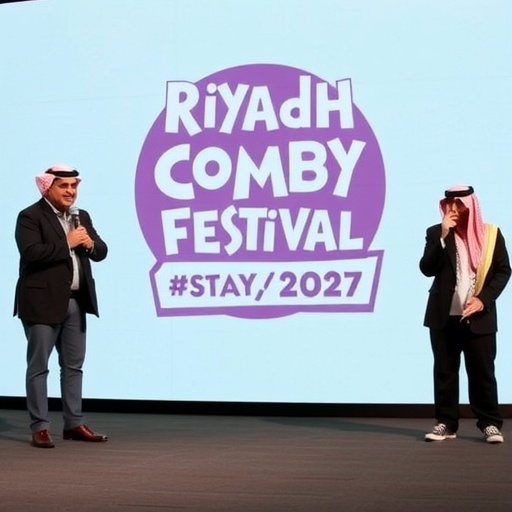Star-Packed Riyadh Debut Ignites Laughter and Debate
In a bold move blending humor with diplomacy, Saudi Arabia’s inaugural Riyadh Comedy Festival brought together over 50 international comedy heavyweights, including Dave Chappelle and Kevin Hart, to the kingdom’s capital. The event, held from October 15 to 18, 2024, at the expansive Riyadh Boulevard City, drew crowds of more than 100,000 attendees, marking a significant push by the Saudi government to diversify its entertainment offerings under Vision 2030. However, the star-studded affair quickly escalated into a flashpoint of controversy, as human rights organizations and fans accused the participating comedians of whitewashing Saudi Arabia’s troubling record on issues like women’s rights, LGBTQ+ freedoms, and political dissent.
The festival’s opening night set the tone with Chappelle’s signature satirical edge, poking fun at cultural clashes and global politics in a sold-out arena buzzing with excitement. Hart followed with high-energy routines that had the audience roaring, blending personal anecdotes with observational humor. Yet, outside the venue, protesters waved signs reading “Laughter Can’t Hide Oppression,” highlighting the ethical dilemma at the heart of the Riyadh Comedy Festival. This juxtaposition of joy and judgment underscores the complex interplay between entertainment and geopolitics in the modern world.
Organized by the Saudi General Entertainment Authority (GEA), the four-day extravaganza featured a diverse lineup spanning stand-up, improv, and sketch comedy. Tickets ranged from free outdoor shows to premium VIP packages costing up to 1,500 SAR (about $400 USD), making it accessible to locals and tourists alike. Attendance figures released by the GEA indicate a 95% occupancy rate across venues, injecting an estimated $50 million into the local economy through tourism and hospitality. But for many, the economic boost pales in comparison to the moral questions raised by artists performing in a country where same-sex relations can lead to imprisonment and public floggings remain a legal punishment.
Global Comedians Navigate Saudi Spotlight and Scrutiny
Dave Chappelle, whose Netflix specials have garnered over 100 million views worldwide, headlined the festival with a 90-minute set that delved into themes of identity and freedom—ironic, given the venue. “Comedy is universal, but context matters,” Chappelle quipped during a post-show interview with local media, acknowledging the whispers of backlash without directly addressing them. His participation, reportedly secured with a $2 million fee, has divided fans; social media erupted with hashtags like #BoycottChappelleSaudi, amassing over 500,000 posts in the first 48 hours.
Kevin Hart, no stranger to international tours, brought his infectious charisma to the stage, performing routines from his recent “Reality Check” special. Hart’s set, which included light-hearted jabs at fatherhood and fame, was met with thunderous applause from a predominantly young Saudi audience eager for Western pop culture. In a statement to Variety, Hart defended his decision: “I’m here to spread joy, not politics. Laughter bridges divides.” Yet, critics point to Hart’s past controversies, including his 2019 Oscar hosting withdrawal over homophobic tweets, as evidence of selective ethics when lucrative opportunities arise in Saudi Arabia.
Other notable performers included British comedian Russell Peters, known for his multicultural takes, and Egyptian star Bassem Youssef, the “Jon Stewart of the Arab world,” who drew parallels between his own experiences under censorship in Egypt and the broader Middle East. Youssef’s involvement added an intriguing layer, as he navigated jokes about authoritarianism without crossing lines that could jeopardize his safety. The festival also showcased emerging talents like Saudi native Fahad Albutairi, whose bilingual sets celebrated local humor while gently challenging social norms.
Behind the scenes, logistics were a marvel of modern entertainment. The GEA invested $20 million in production, importing state-of-the-art lighting and sound systems from Europe. Security was tight, with over 2,000 personnel ensuring smooth operations amid the high-profile guest list. For the comedians, accommodations in luxury hotels like the Ritz-Carlton Riyadh offered a stark contrast to the kingdom’s austere image, complete with private jets for some arrivals.
Human Rights Groups Amplify Voices Against Festival Participation
The controversy surrounding the Riyadh Comedy Festival intensified as human rights advocates launched scathing campaigns. Amnesty International issued a statement condemning the event as “artwashing,” a term coined to describe how cultural spectacles mask governmental abuses. “By performing in Saudi Arabia, these comedians lend legitimacy to a regime that executed 196 people in 2022 alone, including for non-violent offenses,” said Philip Luther, Amnesty’s Middle East research director. The organization highlighted cases like that of Salma al-Shehab, a British-Saudi academic sentenced to 34 years in prison for tweets criticizing the government.
Human Rights Watch echoed these sentiments, releasing a report titled “Comedy in the Shadows of Repression” that detailed restrictions on free speech in Saudi Arabia. The report cited the 2023 arrest of comedian Abdullah Al-Hamid for satirical posts, underscoring the risks for local performers. “International stars like Chappelle and Hart are not just entertaining; they’re endorsing a system that silences dissent,” argued Sarah Leah Whitson, executive director of DAWN, a U.S.-based advocacy group focused on the Arab world.
Social media amplified the backlash, with influencers and celebrities weighing in. Actress Emma Watson tweeted, “Humor should uplift, not obscure injustice. #RiyadhComedyFestival,” garnering 2 million likes. Petitions on Change.org calling for boycotts collected over 150,000 signatures within days, pressuring sponsors like Pepsi and Uber, who pulled funding amid the uproar. On the flip side, pro-festival voices argued that cultural exchange could foster reform, pointing to Saudi’s recent changes like allowing women to drive since 2018 and hosting concerts by artists such as BTS and Justin Bieber.
Interviews with affected communities revealed deeper pain. LGBTQ+ activists in exile, speaking anonymously to BBC Arabic, expressed betrayal: “Seeing Hart, who champions inclusivity, laugh it up in a country where we face death—that hurts more than any joke.” Women’s rights groups, including those tracking the case of activist Loujain al-Hathloul, who endured torture for advocating driving rights, used the festival as a rallying point to renew global calls for accountability.
Saudi Vision 2030 Fuels Entertainment Boom and Cultural Shifts
At its core, the Riyadh Comedy Festival is a cornerstone of Saudi Arabia’s Vision 2030, Crown Prince Mohammed bin Salman’s ambitious plan to reduce oil dependency by bolstering tourism and entertainment. Since its launch in 2016, the initiative has poured billions into mega-projects like NEOM and the Red Sea resorts, aiming to attract 100 million visitors annually by 2030. The GEA, established in 2016, has overseen a surge in events: from the Formula E race in Diriyah to the Jeddah Season with fireworks and concerts, transforming a once-conservative society.
Statistics paint a picture of rapid change. In 2023, Saudi Arabia hosted over 130 entertainment events, up from just a handful a decade ago, generating $13 billion in revenue. The comedy festival fits this narrative, with the GEA reporting a 40% increase in youth engagement with arts and culture programs. Local comedian Mohammed Al-Shammari noted in a Arab News op-ed, “This festival isn’t just laughs; it’s a step toward opening minds in a country ready for evolution.”
Yet, skeptics view these efforts as superficial. Reforms like the 2019 easing of male guardianship laws have been criticized as incomplete, with women still requiring permission for passports in some cases. Economically, the entertainment push employs over 50,000 Saudis, but labor rights issues persist, including reports of migrant worker exploitation in event construction. The festival’s backdrop—a nation grappling with the 2018 killing of journalist Jamal Khashoggi—adds layers of skepticism to its glossy facade.
Cultural nuances emerged during the event. Performers adapted material to respect local sensitivities; for instance, Chappelle avoided his more provocative transgender jokes, opting for safer topics. This self-censorship sparked debates on artistic integrity, with comedy writer Sara Pascoe tweeting, “When humor bows to hosts, it’s no longer comedy—it’s compliance.” Still, the festival’s success in drawing diverse crowds, including families in abayas and thobes mingling with expats, hints at a society in flux.
Future Festivals Face Ethical Crossroads and Global Eyes
As the dust settles on the Riyadh Comedy Festival, questions loom large for future iterations. Organizers have already announced plans for a 2025 edition, promising even bigger names and expanded venues, potentially including outdoor amphitheaters in AlUla’s ancient rock formations. The GEA aims to position Saudi Arabia as the “Entertainment Capital of the Middle East,” with comedy as a flagship genre to rival Dubai’s comedy clubs.
For the comedians, the fallout could reshape tour decisions. Agents report a spike in inquiries about ethical vetting for Middle Eastern gigs, with platforms like Netflix monitoring artist alignments. Chappelle, whose deal with the streamer is worth $60 million, faces potential sponsor pullouts, while Hart’s production company might pivot to more “neutral” markets. Emerging Saudi talents, however, see opportunity: the festival launched scholarships for 20 local comedians, fostering a homegrown scene that could bridge cultural gaps.
Broader implications ripple through the entertainment industry. Will backlash deter stars from authoritarian regimes, or will financial incentives prevail? Experts like cultural analyst Marc Owen Jones predict a “selective engagement” trend, where artists choose events tied to reform progress. Human rights groups vow continued pressure, planning awareness campaigns ahead of next year’s event. Meanwhile, Saudi officials tout the festival’s role in soft power, with Foreign Minister Faisal bin Farhan stating, “Culture builds bridges where politics falters.”
Ultimately, the controversy surrounding the Riyadh debut reminds us that laughter, while healing, cannot exist in a vacuum. As Saudi Arabia courts the world stage, the kingdom’s ability to address criticisms head-on may determine whether future festivals amplify voices of change or echo chambers of evasion. With global eyes watching, the next chapter in this comedic saga could redefine entertainment’s role in international relations.








